Nuclear industry defends Sizewell C project as Hinkley Point C is priced at £33bn

Sizewell C will be a huge boost to the UK’s energy ambitions, helping the country cut its reliance on overseas suppliers to meet its needs, argued the country’s leading nuclear industry body.
Tom Greatrex, chief executive of Nuclear Industry Association, came out in defence of the upcoming project after EDF raised its estimate for the cost of sister power plant Hinkley Point C.
He told City A.M.: “Sizewell C will be one of Britain’s biggest-ever green infrastructure projects alongside Hinkley Point C, providing home-grown, clean electricity for six million homes for 80 years, significantly strengthening UK energy security and net zero targets.
“Britain needs more nuclear alongside other clean energy infrastructure projects to prevent more gas-driven crises sending inflation soaring, which has led to supply chain challenges across the clean energy sector.”
Greatrex’s support of the UK’s nuclear ambitions follows EDF hiking projections for Hinkley Point C’s overall construction costs from £26bn to £33bn in line with inflation – way above its initial £18bn budget.
The project is also facing a cash crunch, with Hinkley Point C’s Chinese state partner CGN not required to offer further funding for the project – which is supposed to be completed in 2027, two years after its initial completion date.
EDF’s hike in estimates for Hinkley Point C reflects the difference in inflation between 2015 and 2023 when the project was priced – with customers incurring no extra costs.
However, it brings into focus the heavy upfront cost of the UK’s nuclear ambitions, with Rolls Royce’s plans for small modular reactors facing delays over funding concerns – after the government pushed back a decision over whether to back the initiative with more taxpayer money.
Greatrex argued that the best way to drive down the heavy upfront costs for new power plants was to approve a pipeline of projects, which would be built in stages – rather than going from one project to another.
“We know from the experience of other countries that delivering a programme of new nuclear plants at pace is the best way to contain costs and get us to where we need to be,” the industry chief said.
Sizewell C awaits final green light
Dr Peter Bird, nuclear industry expert and managing director of consultancy firm Berkeley Research Group, told City A.M, he was not surprised by the rise in projected costs for the project – with industry vulnerable to “inflationary pressures.”
He argued green-lighting more projects was essential for easing costs, and noted the lucrative role nuclear energy generation can play in industry returns.
He said: “The high level of profits reported by Centrica demonstrates how existing nuclear plants have hedged rising fossil fuel costs over the last year – and new nuclear will play the same role going forward. Also notable is the fact that much of the high cost of Hinkley Point C is ‘first of a kind’ cost; as a pipeline is rolled out, costs should come down as construction lessons are learned.”
This position was shared by Sizewell C’s management team, with the site being overseen by French energy giant EDF – which currently has a 50 per cent stake in the project.
A project spokesperson said: “Sizewell C will lower household energy bills, help fight climate change and create thousands of jobs up and down the country. We’re excited at the prospect of starting construction next year and delivering this vital project for the country.”
Sizewell C is a 3.2GW nuclear power plant which has been backed by £700m in public funds, with the government taking a 50 per cent stake in the project alongside EDF for the initial construction phase.
Downing Street has also paid out £100m to CGN to force the company out of the project.
EDF currently awaits a final investment decision from the government before construction can begin, which is expected by 2024 – while estimates for the project’s cost vary from £20-35bn.
This would mean nuclear power generated 25 per cent of the UK’s energy demand, with former Prime Minister Boris Johnson establishing plans for the UK to build eight new reactors this decade.
Currently, the UK’s ageing nuclear stock makes up around 15 per cent of the country’s energy generation, but the remaining five power plants are set to be shut down by the middle of the next decade.